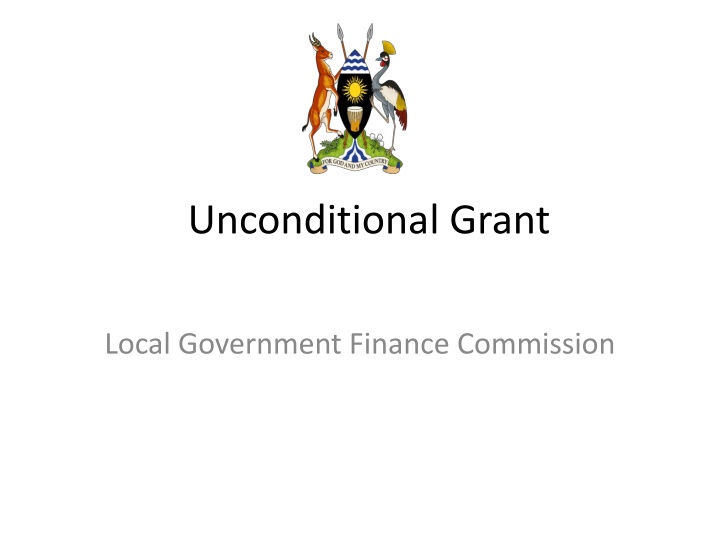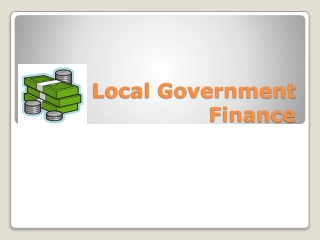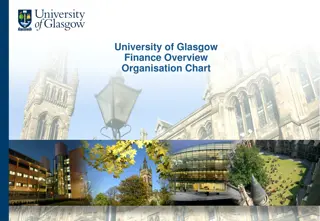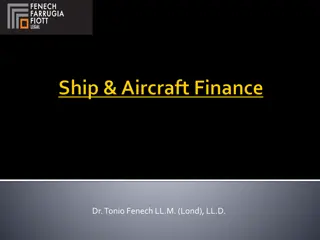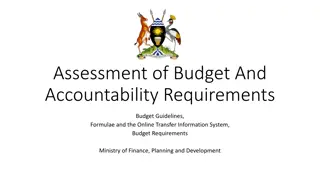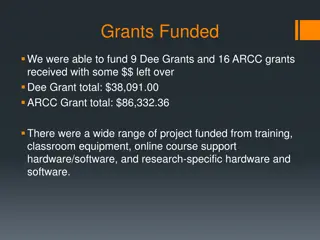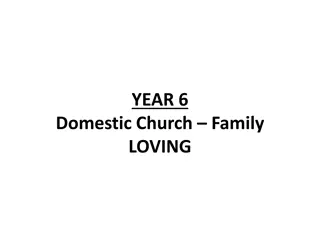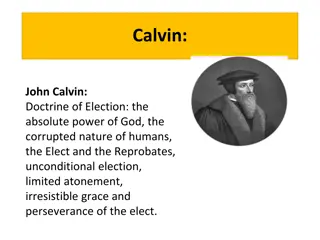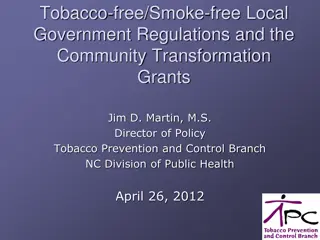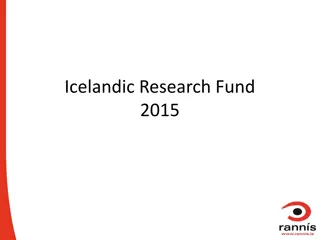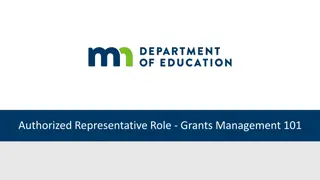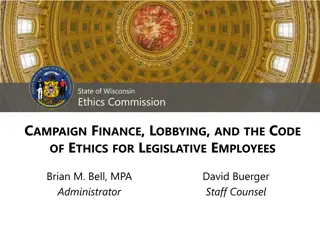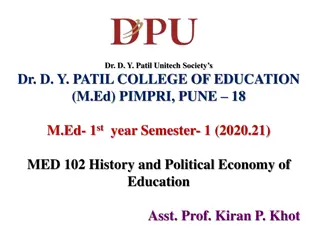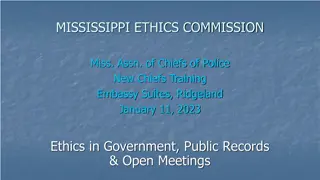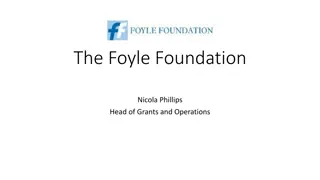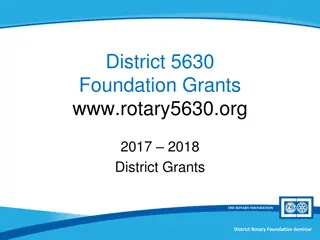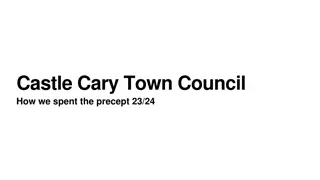Improving Local Government Finance Commission through Unconditional Grants
Addressing issues surrounding grants allocation and transparency to enhance local government finance. Efforts include implementing fiscal decentralization architecture, reviewing grants allocation formulae, and prioritizing sustainable financing for local governments.
Download Presentation

Please find below an Image/Link to download the presentation.
The content on the website is provided AS IS for your information and personal use only. It may not be sold, licensed, or shared on other websites without obtaining consent from the author.If you encounter any issues during the download, it is possible that the publisher has removed the file from their server.
You are allowed to download the files provided on this website for personal or commercial use, subject to the condition that they are used lawfully. All files are the property of their respective owners.
The content on the website is provided AS IS for your information and personal use only. It may not be sold, licensed, or shared on other websites without obtaining consent from the author.
E N D
Presentation Transcript
Unconditional Grant Local Government Finance Commission
Presentation Outline 1. Outline of issues and how they have been resolved 2. Overview of the 2017/18 Budget Guidelines Policy priorities/sector objectives Structure and Purpose of Sector Transfers Allocation Formulae Budget Requirements 3. Other Sectoral Issues Ministry of Local Government Local Government Finance Commission 10/8/2024 UNCONDITIONAL GRANT GUIDELINE 2
Overview of the Issues and How they were addressed Issue How addressed Grants Allocation formulae not transparent and lacked equity The recommendations discussed implementation. They include: Review of the Grants Allocation Formulae. Designing a Fiscal Decentralisation Architecture (FDA). Determining LG share (grants transfers) out of the national budget. LG financing were prioritised study further and for Adhoc Grant allocation criteria and poor formulation of new grants Serious funding gaps at LGs Discussions and reviews are still on to secure sustainable LG financing. 10/8/2024 UNCONDITIONAL GRANT GUIDELINE 3
Overview of the Issues and How they were addressed Issue How addressed Establishing and Rolling out of the local revenue database for local revenue enhancement in LGs. Review of the some of the relevant legislation on local revenue management is underway is collaboration with the Law Reform Commission. FDA Design. Reviewing negotiation framework. Implementation on all the above has Poor Local Revenue performance Some relevant legal provisions had several inadequacies Poor implementation of the key LG financing provisions Conflicting institutional roles, etc UNCONDITIONAL GRANT GUIDELINE started. 10/8/2024 4
Overview of the 2017/18 Grant Information and Budget Requirements Policy priorities/sector objectives Structure and Purpose of Sector Transfers Allocation Formulae Budget Requirements 10/8/2024 UNCONDITIONAL GRANT GUIDELINE 5
Policy Priorities A number of priorities were set out in the NDP to which the UCG is contributing, including: Strengthen Public Financial Management, through the introduction of the IFMS, Performance Based Budgeting and the reform of fiscal transfers. Increase public demand for accountability and strengthen compliance with accountability rules. Improve citizen participation and contribution in promoting rule of law, transparency and accountability in the provision of services to achieve equitable and sustainable development. Improve coordination, and harmonization of policy, planning, budgeting, and M&E at National and Local Government levels. Improve public service management, operational structures and systems for effective and efficient service delivery. Enhancing the performance of the public sector and strengthening service delivery. The Decentralisation of the Payroll, the Human Resources Function through the IPPS. 10/8/2024 UNCONDITIONAL GRANT GUIDELINE 6
Structure and Purpose of the Unconditional Grant Grant District Unconditional Grant Purpose To fund the salaries of staff paid from the traditional Local Government payroll (i.e. all staff except teachers, health workers, extension workers) in the HLG and LLGs To fund both the recurrent and development costs of decentralised services alongside locally raised revenues in the higher Local Government and lower local governments Urban Unconditional Grant o/w Municipality government payroll (i.e. all staff except teachers, health workers, extension workers) in urban areas Council o/w Municipality decentralised services alongside locally raised revenues in urban areas Council Wage o/w District o/w Sub- county Non Wage To fund the salaries of staff paid from the traditional local Wage o/w Town To fund both the recurrent and development costs Non Wage o/w Town 10/8/2024 UNCONDITIONAL GRANT GUIDELINE 7
Structure and Purpose of PSM Transfers Grant Support Services o/w Pension and Gratuity Transitional Development Purpose To provide for pension and gratuity payments for former Local Government employees Ad hoc allocation to local governments for administrative activities. o/w Ad Hoc NB: These allocations are not formula based 10/8/2024 UNCONDITIONAL GRANT GUIDELINE 8
Formula for Un-conditional Grant Wage Allocation The formula for UCG wage is in the process of being developed. The IPFs are based on the existing wage bill from MoPS plus approved recruitment by the Ministry of Public service. Variable District Municipal Town Council 100 Justification MoPS Wage Bill 100 100 Wage Bill Allocation from MoPS 10/8/2024 UNCONDITIONAL GRANT GUIDELINE 9
Formula for Unconditional Grant Non- Wage Recurrent District Sub- county al 45 30 28 Number of sub- counties/Number of town councils Variable Municip Town Council 30 Justification Constant To ensure the basic costs of delivering administrative services in a local government can be met, whatever its size. Reflects the scale of beneficiaries for service delivery in local governments. To cater for the varying costs of delivering services in a local government, which are influenced by their geographical size and terrain and distance from Kampala. 10 10 Population (Rural/Urban) 40 70 60 70 Land Area (Hectares) 2 0 0 0 Population in Hard to reach and to stay areas 2 0 0 0 Distance From Kampala 1 0 2 0 10/8/2024 UNCONDITIONAL GRANT GUIDELINE 10
Public Sector Management Grant Allocations Management grant would remain ad hoc, and not formula based. The support services grant is currently comprised of: Pension and gratuity Urban Ad-hoc Rural Ad-hoc under the Public Sector 10/8/2024 UNCONDITIONAL GRANT GUIDELINE 11
Unconditional Grant Allocation Formulae The above formulae will be phased in over the medium term. This formula itself and the medium term allocations and phase in plan for the allocation formulae is available on the budget website: www.budget.go.ug/fiscal_transfers. An individual local government s allocation formula can also be found on the site. 10/8/2024 UNCONDITIONAL GRANT GUIDELINE 12
Overview of Budget Requirements Area Narrative and performance contract Requirement The budget narrative summarises information on revenue, expenditure and key outputs in the performance contract. Total Workplan revenues and expenditures balance and are divided correctly between wage, non-wage recurrent, GoU and donor development. The revenues should also be divided correctly between higher and lower local governments Salaries of permanent staff must not exceed the overall staff and budget ceilings. Salaries must be funded from the unconditional wage grant. Salary allocations to administrative departments must be according to the filled posts within the approved structure, recruitment plan and salary scales. Overview of Revenues and Expenditure Salaries and related costs 10/8/2024 UNCONDITIONAL GRANT GUIDELINE 13
Overview of Budget Requirements Area Salaries and related costs (cont) Requirement Salaries, allowances and gratuity for elected leaders and members of statutory bodies must be budgeted for in full. Pension and gratuity (computed pension) for retired staff must be budgeted for in line with public sector management grant allocations. The Unconditional Non-Wage Recurrent Grant must be allocated to Lower Local Governments using the schedule that accompanies the IPFs for districts and municipalities. Non-wage allocations to the Work plan for Statutory Bodies must be equal to, or greater than, the FY 2016/17 IPFs. The allocation for the IPPS and IFMS must be equal to or greater than the FY 2016/17 IPFs. Lower Local Services Higher Local Services 10/8/2024 UNCONDITIONAL GRANT GUIDELINE 14
Overview of Budget Requirements (cont.) Area Monitoring and Management Capacity Development Requirement A maximum of 5%of the non-wage recurrent budget can be used for monitoring and management of service delivery under the Administration Work plan. Capacity building activities should be consistent with the positive and negative lists, below. The development budget should fund administrative capital investments only. At most, 10% of budget allocations to construction and rehabilitation will finance investment service costs, such as bills of quantities or economic impact assessments. Local governments must not budget for activities specified in the negative list for capital investment. Development Investments 10/8/2024 UNCONDITIONAL GRANT GUIDELINE 15
Other Sector Issues 10/8/2024 UNCONDITIONAL GRANT GUIDELINE 16
LGFC PRIORITIES BEING IMPLEMENTED FY2013/14 - FY2017/18 Review of the Grants Allocation Formulae; Designing a Fiscal Decentralisation Architecture (FDA); Determining LG share (grants transfers) out of the national budget; Review of conditional grants negotiation process; Establishing and Rolling out of the local revenue database for local revenue enhancement in LGs; Review of the relevant legislation on local revenue management. 10/8/2024 UNCONDITIONAL GRANT GUIDELINE 17
Review of the Grants Allocation Formulae The Formulae were revised thus some LGs gained more funds and others lost some funds. Several mitigation measures will, however, be implemented in the medium term to re-instate the real value of the transfers and increase funding to LGs in line with the new formulae. There was also a reduction in the earmarking of grants as well as the replacement of grant conditions with sector budget requirements. The new formulae will be phased over the medium term 10/8/2024 UNCONDITIONAL GRANT GUIDELINE 18
Negotiations on Conditional Grants Article 193(3) of the Constitution requires negotiations between local governments and sector ministries managing conditional grant funded programs to take place with a view of coming up with a transparent and effective system of implementing programs funded using conditional grants. For FY 2017/18, the Commission had scheduled to conduct the negotiations in August 2016 but has not been able because of resource constraint in the first quarter. It is therefore planned that resources being available, the Commission will be conducting and facilitating negotiations by end of October 2017 to enable the results feed into the budget formulation process. 10/8/2024 UNCONDITIONAL GRANT GUIDELINE 19
Design of the Fiscal Decentralization Architecture The allocation formulae has been reviewed and this will be followed by the Design of the Fiscal Decentralization Architecture (FDA)or the LG financing framework and determination of the share of transfers in the national budget. FDA elements indicated in figure1 below shall be reconfigured to give shape to LG financing. The design of the FDA will focus on the key elements which were found to have gaps as reflected in the figure below. These are the legal and practical provisions that shall ensure orderly operation, protection, credibility and reliability of the fiscal decentralisation system. This will also constitute the fourth phase of the current reforms in the Fiscal Decentralisation. 10/8/2024 UNCONDITIONAL GRANT GUIDELINE 20
Figure 1: The Pillars (6) of the Proposed FDA 10/8/2024 UNCONDITIONAL GRANT GUIDELINE 21
Determining LG Share out of National Budget This phase shall also include, reviewing LG mandates and estimating the cost of adequately financing those mandates relative to the overall budget This is to ensure that the size of grant transfers to LGs is commensurate with the range of services provided by the LG's which helps to improve confidence in budgets and sustain service delivery. Status: The Commission has secured support from FINMAPIII to undertake this phase of the reforms effective October 2016. 10/8/2024 UNCONDITIONAL GRANT GUIDELINE 22
Establishing and Rolling-out of the Local Revenue Database From the series of studies that have been undertaken by the Commission and several other organizations and research institutions regarding local revenue enhancement in LGs, one of the main challenges hindering local revenues in the local governments is lack of credible and sufficient data on the current local revenue sources. The overall objective of establishing local revenue database is to improve the performance of local revenues in the local governments Status: The LGFC with support from FINMAPIII has supported 18 districts in FY2014/15, 25 districts in FY2015/16; will support 30 more districts in 2016/17 and targets to support another 40 in FY 2017/18. 10/8/2024 UNCONDITIONAL GRANT GUIDELINE 23
Establishing and Rolling-out of the Local Revenue Database - Performance The local revenue database system was installed in 122LGs but effectively operational in 24 districts and 14 Mcs under the USMID program. As a result all the districts and municipalities supported have significantly increased their local revenue collections. Between FY2012/13 and FY2013/14 for example, Jinja district improved collections from UGX 597m to UGX 1.0bn while Ntungamo district improved from UGX 289m to UGX 647m; Mbarara MC has improved from UGX 3.6bn to UGX 5.1bn; Aura MC from UGX 2.1 to UGX 3.1; Gulu MC from UGX 1.96bn to UGX 3.87bn; Busia MC from UGX1.76bn to UGX2.75bn just to mention few. 10/8/2024 UNCONDITIONAL GRANT GUIDELINE 24
Challenges of Establishing LR Databases Some of the LGs which have been supported have not given the activity the attention it deserves; so they need to strategically provide support to the LLGs (in terms of operational funds to collect and update data, assess the tax payers and sources e.t.c) and supervision follow-up. Many of these LGs that are receiving the support do not have appropriate equipment like computers and printers, yet they are very necessary and therefore should be included in the budgets for revenue enhancement. 10/8/2024 UNCONDITIONAL GRANT GUIDELINE 25
Review of legislation for local revenues Legal issues have been identified as a major challenge that inhibits the effective management of local revenues. A number of weak legal provisions have been identified that require reviews and amendments to strengthen the legal regime that strongly supports local revenue management in local governments have been proposed. The key ones include those on Local Service Tax, Local Government Hotel Tax, Property Rates, Trading licenses, Market dues, Royalties, Agency fees, Fish licenses and Departmental fees. These provisions were identified and discussed in the Local Revenue Enhancement Committee (LRECC) meetings. The Commission is now working with the Law Reform Commission to enable amendment of the laws effected. The Objectives of these proposals are to improve the local revenue performance from the current collection of UGX 148 billion as of FY 2012/13 to UGX 500 billion. 10/8/2024 UNCONDITIONAL GRANT GUIDELINE 26
